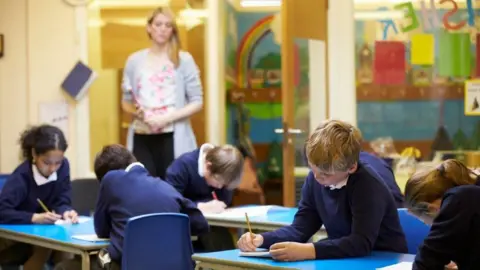Teacher numbers at lowest since 2013, official figures show
 Getty Images
Getty ImagesThe number of teachers working in state-funded schools in England has fallen to its lowest level since 2013, official statistics show.
Last year, 451,900 full time equivalent teachers were working in English state schools, compared with 457,000 in 2016.
Teacher numbers have not been lower since 2013, according to figures published on Thursday by the Department for Education.
The government said recruiting more teachers was a top priority.
Until last year, teacher numbers had been rising steadily.
In 2011, there were 440,000 teachers in English schools, reaching 449,000 by 2013, and 457,000 by 2016 - but last year the number fell sharply.
Dr Mary Bousted, joint general secretary of the largest teachers' union, the NEU, said the statistics would make "grim reading" for Education Secretary Damian Hinds.
She said qualified teachers leaving the profession outnumbered new recruits.
"We are losing teachers too quickly, undoubtedly because the government is burning them out with an excessive workload and they can earn more and have a better work-life balance in another profession."
Chris Keates, general secretary of the NASUWT union, said parents would be particularly concerned that the teacher shortage coincided with evidence of increasing class sizes.
Separate government figures, also published on Thursday, show the number of pupils in England's schools continues to rise, with secondary schools affected for the fourth year in a row.
There are now 66,000 more children in England's schools, compared with last year.
Some of the increase is in primaries but most of it is in secondaries, where overall numbers have risen 35,400 as the baby boom of the early 2000s makes the transition.
'Skills shortage'
The figures suggest the staffing crisis means teachers increasingly lack university-level qualifications in the subjects they teach, with more than a third of physics teachers and almost a quarter of chemistry teachers without a relevant higher education qualification in the subjects.
A spokesman for the Department for Education pointed out that an additional 32,000 trainee teachers had been recruited last year.
"Teacher recruitment will always be challenging in a strong economy with record numbers of jobs," he said.
"But we know there is more to do, which is why the education secretary has made it his top priority to make sure teaching remains an attractive and fulfilling profession."
Paul Whiteman, general secretary of the school leaders' union NAHT, said ministers had until recently failed to heed warnings about staffing.
He urged ministers "to address the root causes of the problem, which sees too few new recruits entering the system and too many experienced hands leaving prematurely".
"Paying teachers' properly for the essential work they do, not overloading them with work, and giving them access to proper professional development throughout their careers are the key steps that the government needs to take. And they need to do it fast," said Mr Whiteman.
